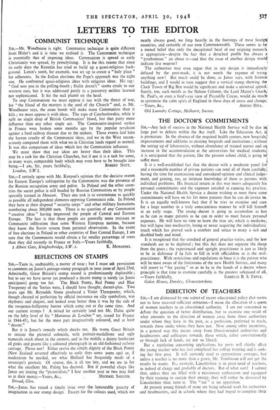THE DOCTOR'S COMMITMENTS
SIR,—Any lack of success in the National Health Service will be due in large part to defects within the Act itself. Like the Education Act, it is premature. In the absence of the required health centres, new hospitals, improvements and additions to existing hospitals and institutions ; without the setting up of laboratories, without abundance of trained nurses and anl increase in the accommodation at the universities for medical students,1 it is anticipated that the patient, like the present school child, is going to suffer most.
It is a well-established fact that the doctor with a moderate panel list and a reasonable number of private patients can tend all of them carefully, having the time for examination and considered opinion and clinical judge- ment, and gaining, too, an intimate knowledge of them as persons with individual problems. His financial return in this way meets adequately his personal commitments and the expenses entailed in running his practice. Under the National Health Service a doctor wishing to meet these same commitments will have on his list more patients than he can do justice to. It is an equally well-known fact that if he tries to examine and care for a large number in a truly conscientious manner he will kill himself at an early stage. The young doctor is going to accumulate as fast as he can as many patients as he can in order to meet future personal expenses. He will have no time to learn the true art, which is medicine, but will lapse into mediocrity, losing or never acquiring the individualistic touch which has proved such a comfort and solace to many a sick and disabled body and mind.
It is recognised that the standard of general practice varies, and the low standards are to be deplored ; but this Act does not separate the sheep from the goats ; the experienced and upright practitioner is just as likely to be in disfavour if he fails to fall in with officialdom as is the mal- practitioner. With restrictions and regulations in force it is the patient who will be most aware of the limitations of the new Health Service, and many will resort to "fee paying" so as to be in the hands of a doctor whose principle is that time to examine carefully is the greatest safeguard of all:, —Yours faithfully, ISABELLE B. S. FAYLE. Galen House, Dursley, Gloucestershire.






























 Previous page
Previous page